With the coronavirus continuing to rage across the United States, the month of June, which is typically filled with parades and festivals in every major city, has had to take a backseat for the first time in years.
But what replaced the annual Pride Parade in New York City this past Sunday, a weekend that marked the 50th anniversary of the first-ever Pride March in 1970, was something many activists who were interviewed on the ground say is what Pride is actually meant to be about: the liberation of all people, regardless of skin color or gender identity, especially Black trans women.
Not a parade that many queer people of color never felt truly welcomed at in the past.
BuzzFeed LGBTQ was on the ground at the Queer Liberation March for Black Lives and Against Police Brutality and spoke to dozens of the activists about this moment where the larger LGBTQ movement finds itself converging with Black Lives Matter's increasingly popular calls to end police brutality in the United States.
And what that should mean for the future.
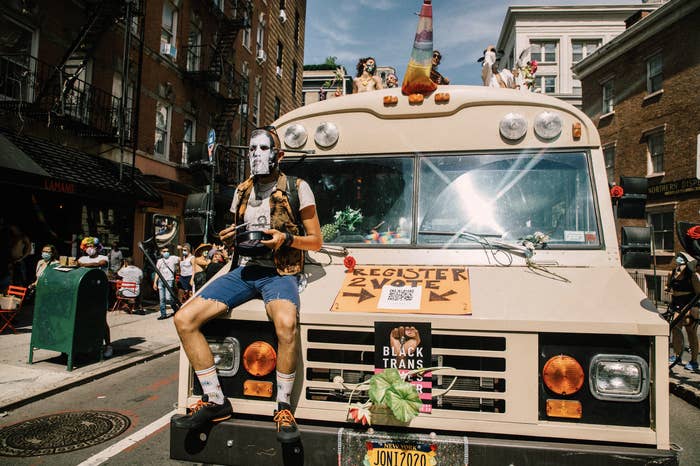
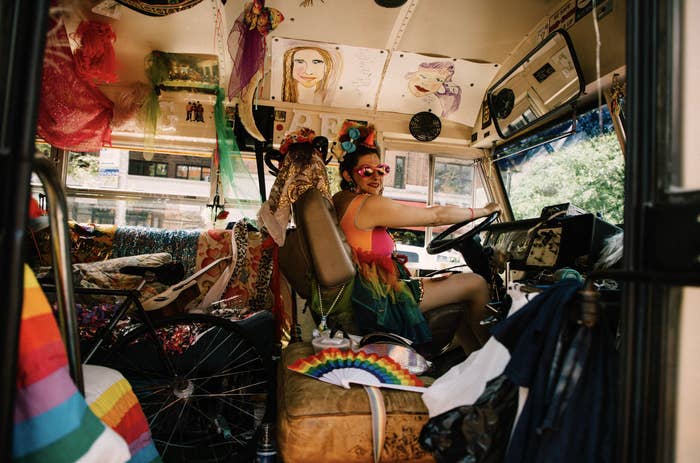
Katie Rose Summerfield and children
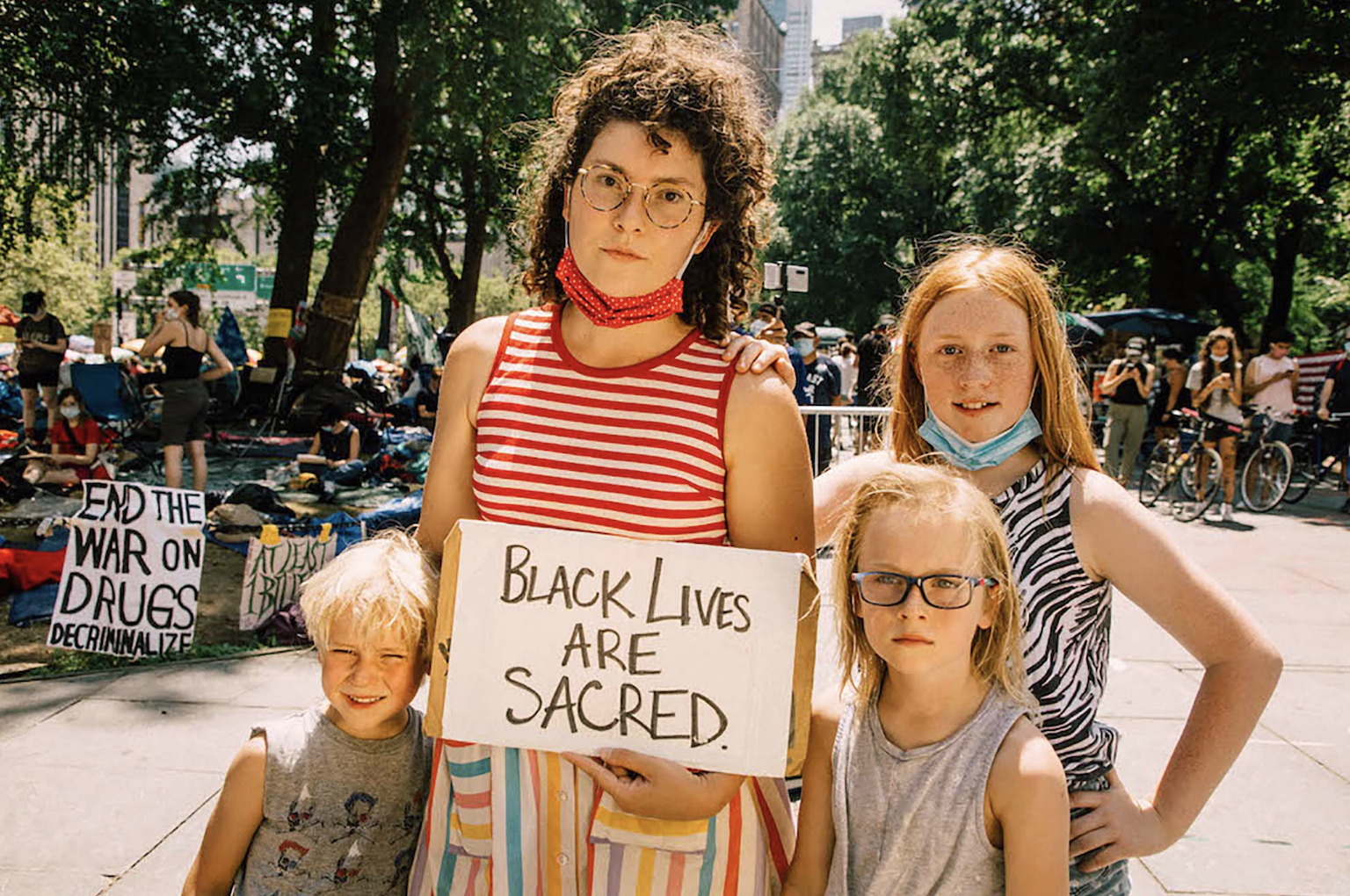
Please, introduce yourself and tell us what brings you out here today.
I am an artist and a human in the world who cares about the humanity of all people. I think it’s essential that we show up for our brothers and sisters who have not been treated with any fairness, kindness, justice, or humanity for hundreds of years. And it’s time that we all be accomplices in the fight for abolition of white supremacy, racism, the police brutality and inequality across everything.
What are your hopes for the future?
My hopes for the future are that everybody in the world, everybody in America, feels safe to live in the body as they are, to be exactly who they are, to be loved tirelessly and fearlessly, and for everyone to feel safe.
Bones Jones
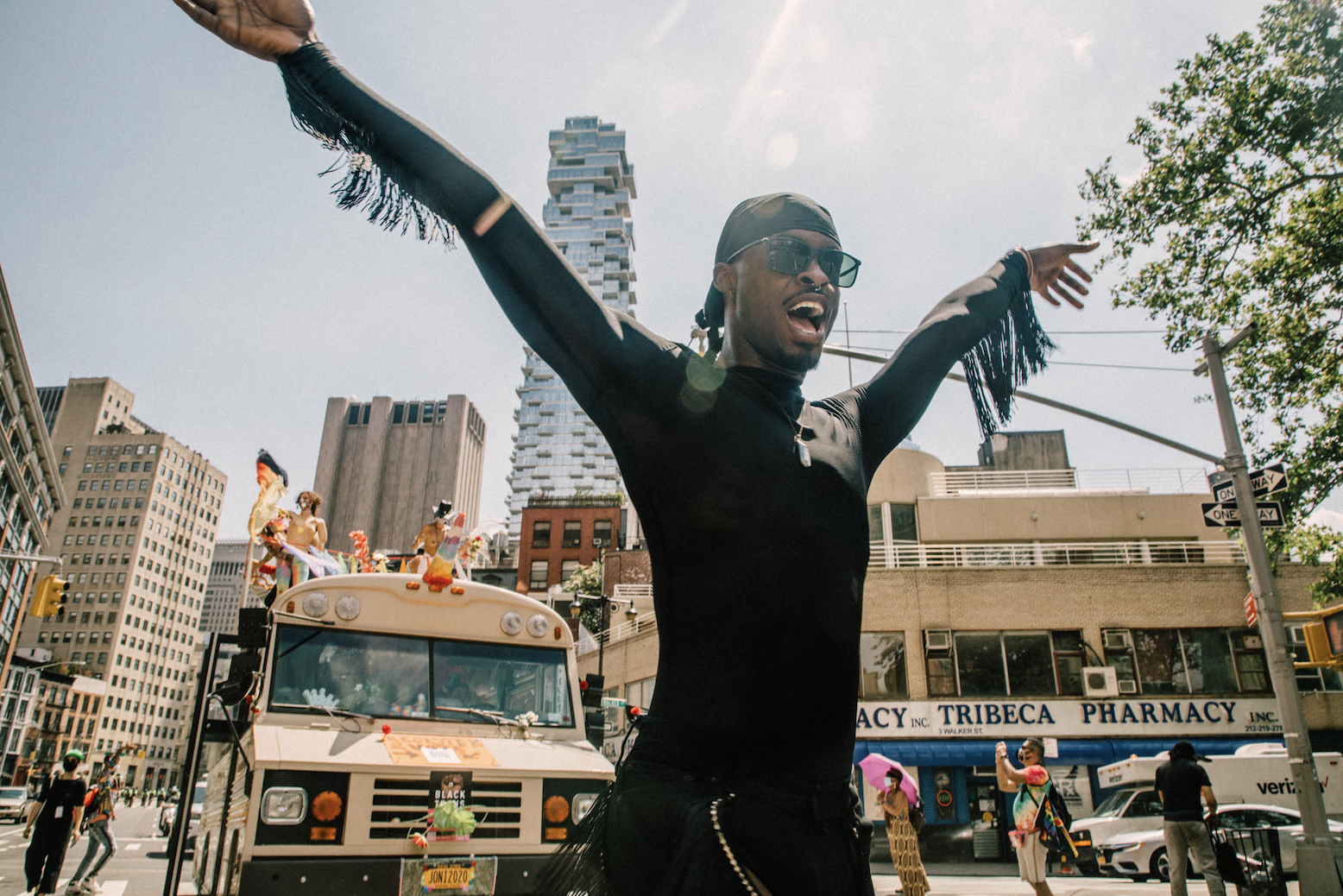
Please, introduce yourself and tell us what brings you out here today.
I am here today at the Queer Liberation March to liberate humanity, honestly. People of the LGBTQIA+ community are the backbone of how culture moves in this country. So I am here to support humanity in this outfit, have a good time, and support those who need support.
What are your hopes for the future?
My hope for the future is that all people have the same rights, the same opportunities, the same abilities. We’ve seen what happens year after year after year when it comes to these things. It gets us nowhere to just oppress one group of people, so my hope and my wish is that we all just get the equal rights, equal opportunities, and just live in peace. Celebrate in peace, love in peace, have sex in peace.
Daniel Nieto
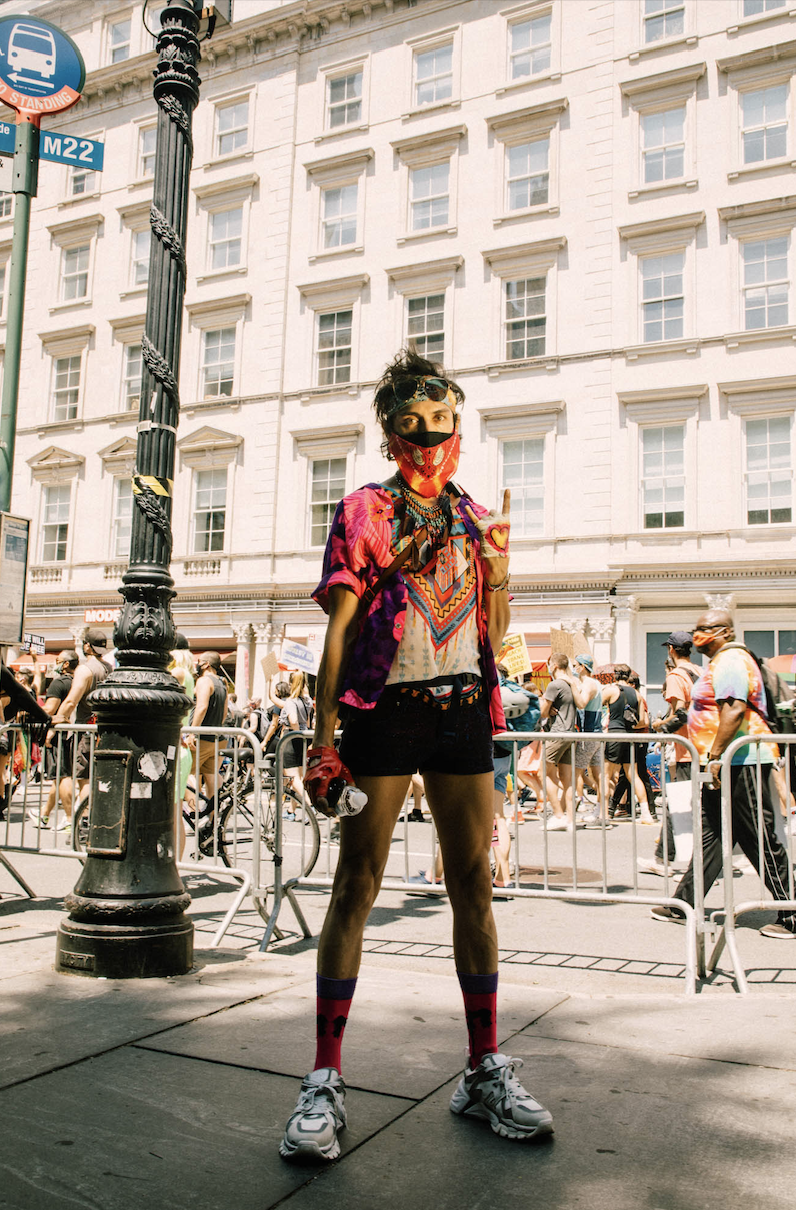
Please, introduce yourself and tell us what brings you out here today.
I am here to fight for freedom, equalities for everybody. Black lives matter, trans lives matter, gay lives matter.
What are your hopes for the future?
My hope for the future is for everyone to be treated equally, with respect, and to have equal freedom and opportunities in this country and everywhere else in the world.
J. Alexander

Please, introduce yourself and tell us what brings you out here today.
I’m here for Pride, I’m here for Black liberation. I’m here to take a stand with all the people that are here today.
What are your hopes for the future?
My hope is that when these people go home, they actually do work, and they educate themselves about decolonizing the mind; they have the hard conversation with their racist aunts. I hope that they speak up for people of color — especially Black people — in these safe white spaces. I hope that the work goes beyond the streets and that we see actual change.
Luis Herrera

Please, introduce yourself and tell us what brings you out here today.
I do many costumes every year. I’ve been coming to the parade almost for 20 years. My name is Luis Herrera, pero my business name is Federika Pucci. I love NY. I love everybody, and I’m here enjoying the party, enjoying everything.
What are your hopes for the future?
Faster 5G phones.
Ty Sunderland

Tell us what brings you out here today.
We are marching here for our liberation. We are not free until our entire community is free. Right now we have to be out here marching for Black lives and Black trans lives.
What are your hopes for the future?
A future where we are all free, we are all safe, where we all have equal opportunity, equal rights, and equal access to resources.
Gabriella Rosa Morales
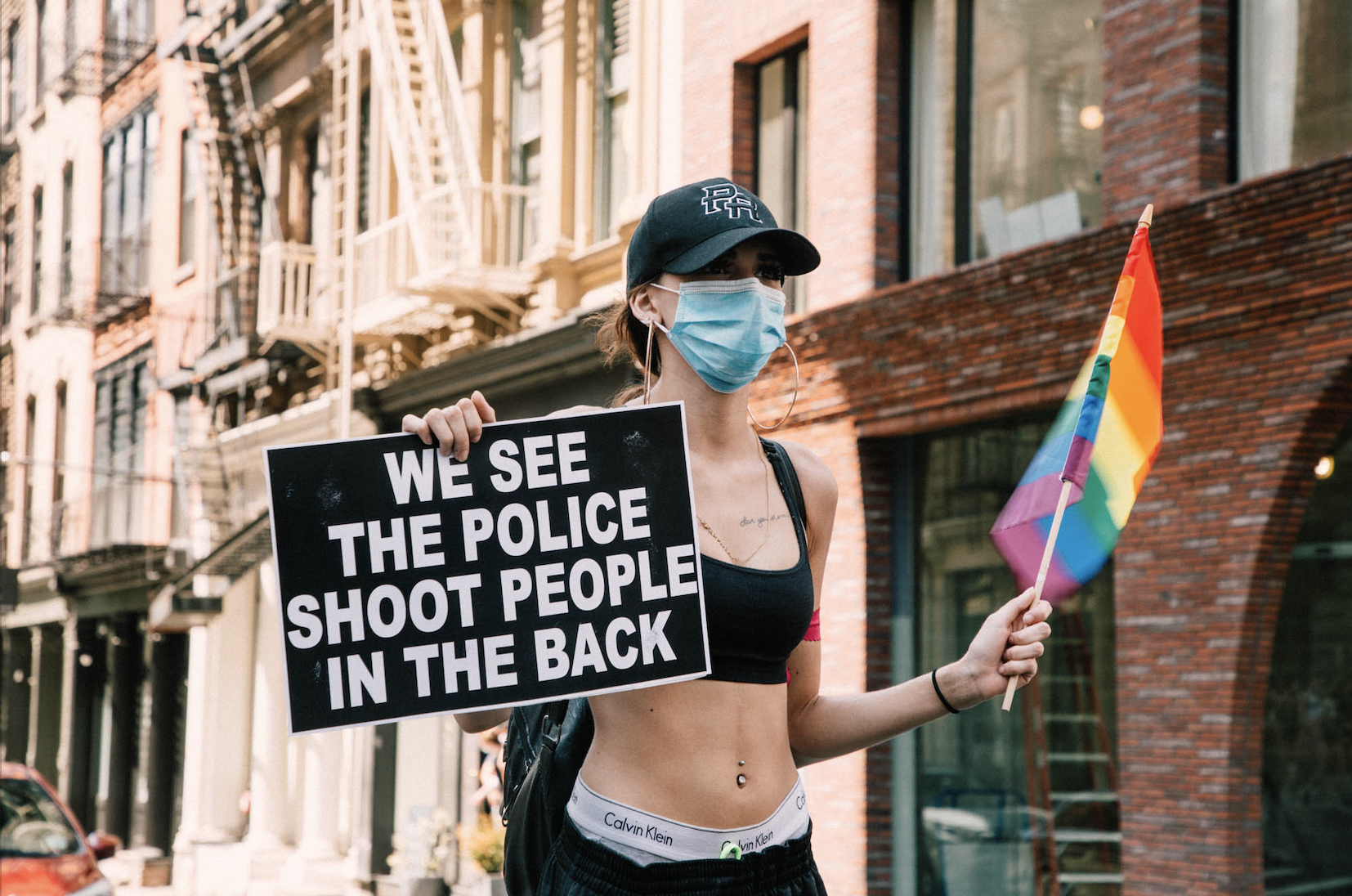
Please, introduce yourself and tell us what brings you out here today.
I’m an Afro Latina, bisexual woman, and I’m tired of the bullshit that’s going on. Honestly, it’s time for change and this is what needs to be happening and nobody is listening to us, so we are going to make them listen. So we are going to keep fighting every day until they listen to us, until we get what we need.
What are your hopes for the future?
My hope for the future is that they defund the police, that they treat every citizen the way they need to be treated and that fucking capitalism changes. White supremacy needs to be out of this country. It’s 2020, and we are still dealing with issues that we’ve been dealing with for hundreds of years. It’s ridiculous. This needs to end now.
Rollerena
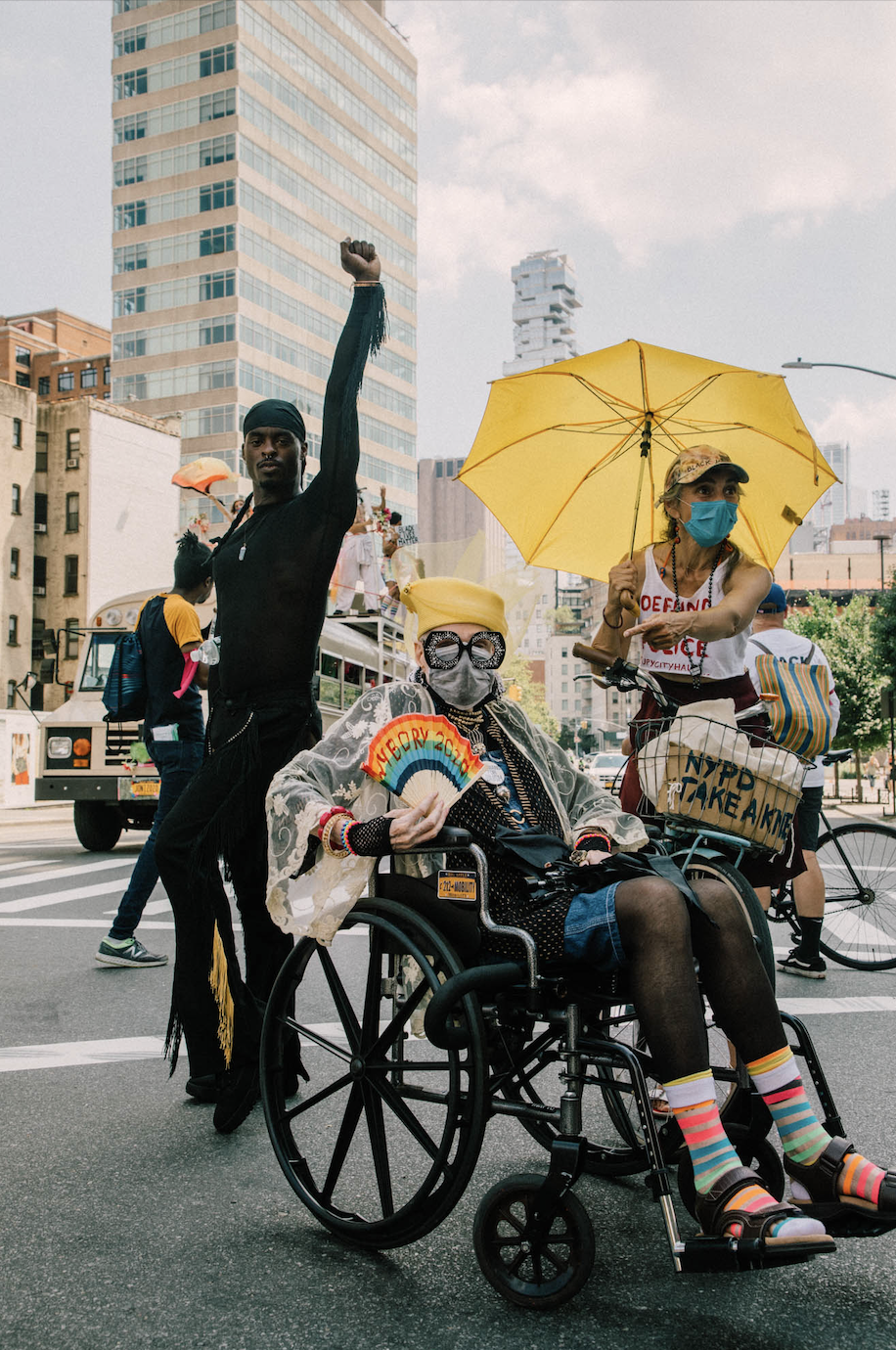
What are your hopes for the future?
My hope for the future is the blue wave on election day, that everybody gets out there and votes. Votes with their conscience and gets this horrible regime out of office.
Glow Job
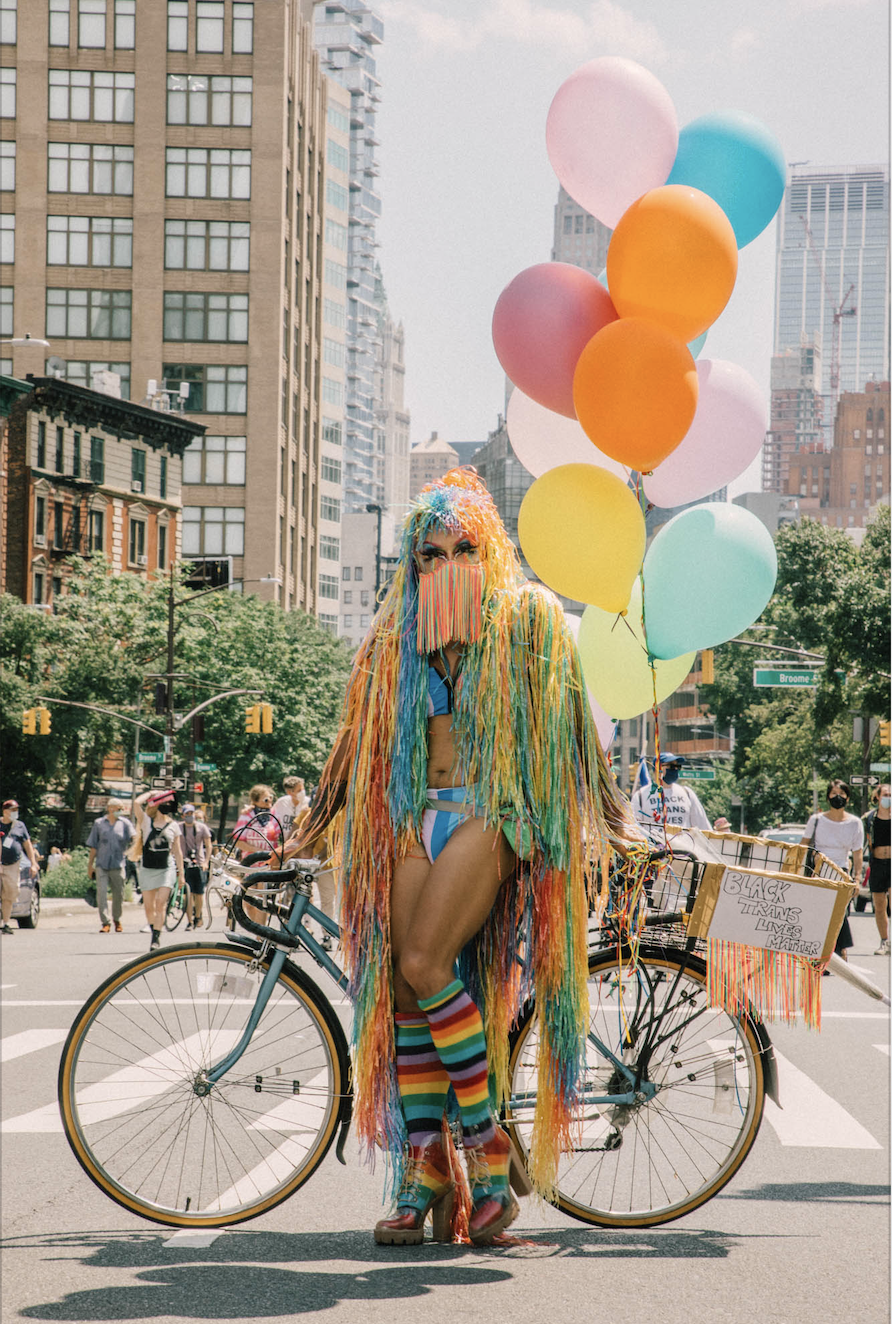
Please, introduce yourself and tell us what brings you out here today.
I am here today, because it’s the Queer Liberation March; it is Pride.
We need to show up; we need to show out. We need to be here for Black lives, for Black trans lives. This feels like, what I imagine maybe, the first Pride was like. It was a freaking protest; it was a riot. And so we are here to make a difference.
What are your hopes for the future?
I feel like things are actually changing for once. I think people are stopping to think... I think they have been disrupted from the system. I want the police to be defunded. I want Black trans people to be respected. I want joy to come back to everyone’s life. That’s why we're here doing this.
Terence Edgerson, Samy Nemir Olivares, Luis Mancheno

Please, introduce yourself and tell us what brings you out here today.
Terence: What brought me here today was trans rights, Black Lives Matter. An equality for all of us — we are marching together to be with all my sisters and brothers and nonbinary folks.
Luis: I am here with my friends and my community. This is our family. Until all of us are liberated, every single person in our community is liberated — trans, Black, queer, nonbinary, Latino people — the queer community will not stop until all of us are fully equal.
Samy: I'm here because this is the real Pride. It started 51 years ago with Sylvia Rivera and Marsha P. Johnson — a riot against police brutality — and we are still criminalized and oppressed by the state and the police forces. So we need to continue organizing, running for office, voting, and getting engaged with our community to actually fight for change, including social justice and a [city] budget that really helps our community.
So we are honoring that life and that spirit of resistance. This is what this march is — to bring that rioting spirit to actually fight for equal justice.
Terence: And the rights for sex workers, which we can’t forget, because the root people that led the riots and the march were Black and trans sex workers.
What are your hopes for the future?
Samy: Well, I really hope that we don’t have to fight against the state and discrimination, that we live in the society that honestly honors our lives, that we have full respect and we have full equality and justice. And that starts with the Equality Act, but we need so much more.
Legal marriage equality [happened], but that just got us the right to love. Now we need the right so we can walk in the streets without violence and being murdered, so the moment that no Black trans women are being killed in the streets, when people are not discriminated at work, when all the eradication of discrimination happens. That’s why we are truly here; that’s why we are marching.
We are not only celebrating that we could march because of the history of our movement, but because there is so much work to be done.
Luis: And of course we hope that the city council of New York defunds the NYPD, defunds the military state in our city and starts funding the real needs of our communities, starts funding education, starts funding housing, starts funding healthcare for people in our community.
Because that's where we really want our tax dollars to be devoted to and not to police violence, not to state violence. I really hope that our state officials, our city and our local elected officials react and respond to the clamor that we are all expressing today.
Terence: My hope for the future is that I won’t have to be out on the streets saying "Trans Lives Matter"; I won’t have to be out on the streets saying "Black Lives Matter"; I won’t have to be on the streets saying "Black Trans Lives Matter."
It’s beautiful that we are saying those, but the reason that we are out here saying those is because we are continuously killed and there is no justice and we have to keep fighting and protesting. I’m hoping for the future that we no longer have to be out on the streets fighting against the state and state will side with us, and they will give us protection.
So that Black trans girls will have protection, Black people will have protection, we want to fight against people that are killing us.
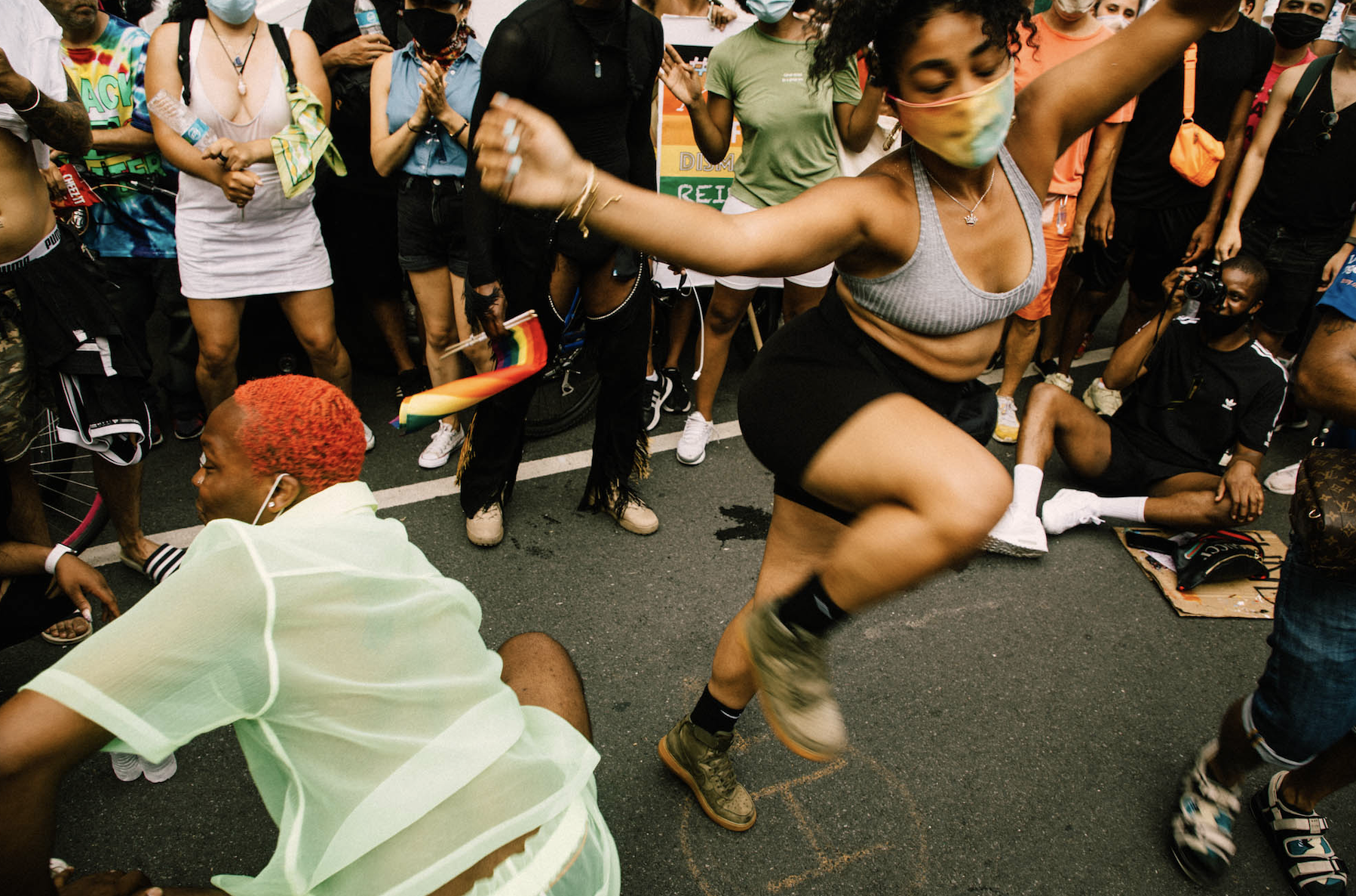
Sammy: This is just the city’s Pride as Black Lives Matter rally, because the most important, impacted members of our LGBTQ community are the LGBTQ people of color: Black trans women, Latinx, undocumented queer immigrants. And it is a movement of solidarity.
Fighting for racial justice is to fight for queer rights; fighting for queer rights is fighting for racial justice. So we are not only standing in solidarity with Black Lives Matter, we also have Black queer lives, we also have immigrant Latinx queer lives and people of color. So this is a movement of solidarity, but we are both because our struggles are very interconnected. That’s why this Pride, this Queer March is so powerful, because it combines the intersectional lives and identities that we all live and they have been oppressed for so long and this is the moment for liberation.
Luis: And at the end, us browns and Black people, we are also protesting against the mainstream LGBTQ community who has for so long discriminated against us, discriminated against our most vulnerable members. And we are saying today: This is the Pride that we want; this is the Pride that we celebrate and nothing from now on in the future will be less.
Terence: No more.
Iman Le Caire
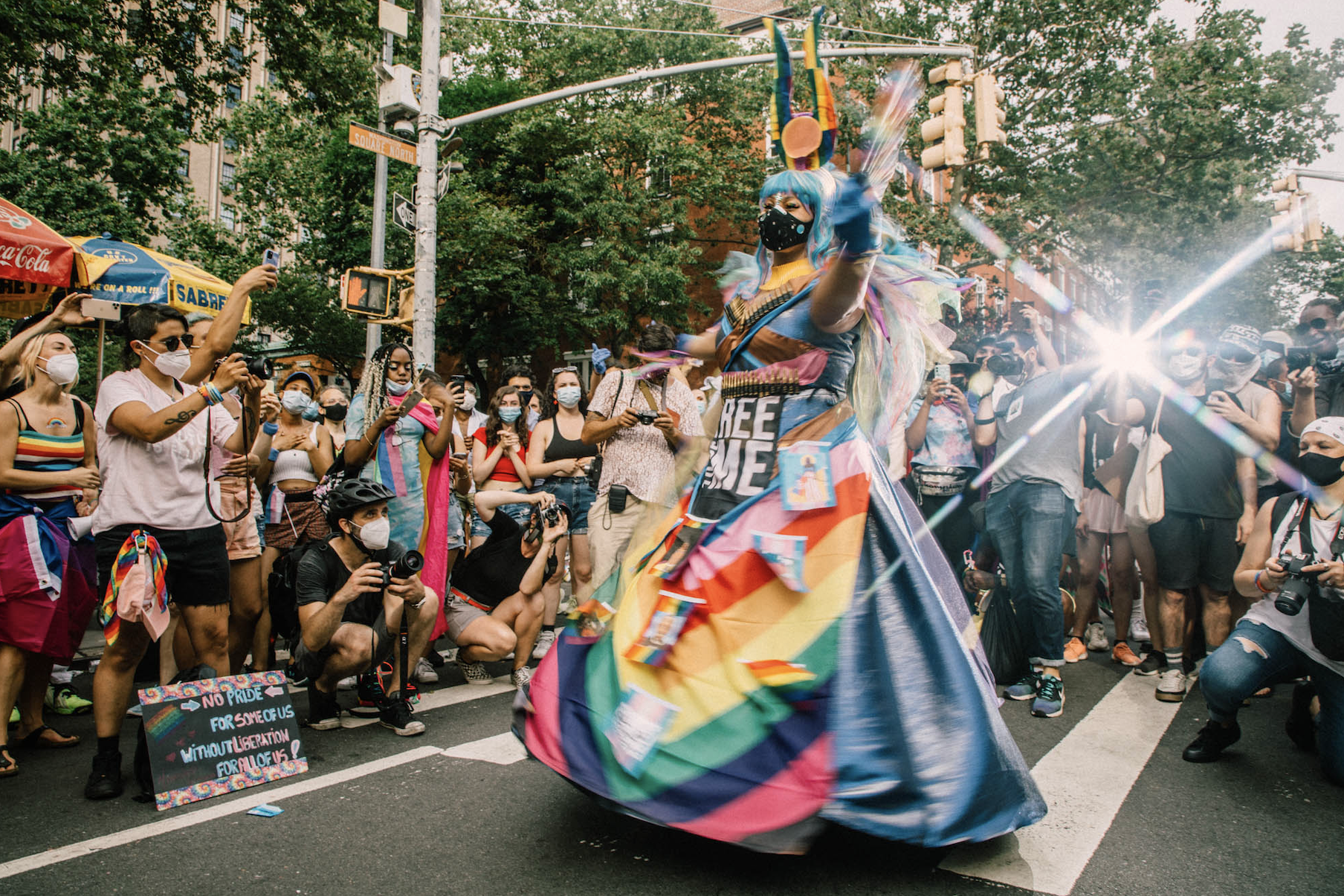
What are your hopes for the future?
My hope for the future for the Black trans sisters and Black trans brothers, for all brown people and refugees to have jobs and to be walking the streets without getting hurt and killed. I’m tired of it. I’ve been harassed since being 8 years old and I’m sick of it.
So I just want to be safe and have opportunities like everybody else. Is that too much to ask? No I don’t think so, so I hope for the future and especially for trans youth to have a better future than I ever had. Hopefully that’s going to happen. I feel optimistic for the future, especially now that we all came together. Hopefully something is going to happen.
And I feel Trump is going to go away.
Cory Walker

Please, introduce yourself and tell us what brings you out here today.
I am out here celebrating Black and brown trans lives and just witnessing a revolution.
It’s been a beautiful way to emerge back into the new world and to be in New York City is such a blessing. Because this is kind of where that kind of liberation began: going to Stonewall and just feeling that energy. I feel like the ancestors are really here. I’m taking it moment by moment; it’s really a lot to digest, but it’s everything we’ve been asking for, so. I think this is our time.
What are your hopes for the future?
Oh, so many. I would say for everyone, every being who enters this plane, this earth, this physical experience, to know that there is so much worthiness and rightness in their existence.
I would love for kids to be born knowing that there is a reason that they are here and that they have the power, that their evolution and their natural flow is going to look so specific for them and that’s beautiful. And I want the people who maybe didn’t have that, who are kind of learning that about themselves now, I want them to heal and be graceful knowing that they always did and survived the best way they knew how.
And for people to just have more empathy and compassion and to really see each other again more, maybe for the first time. We are all kind of seeing ourselves for the first time. I think we are all being initiated into ourselves. So, my hope for the future, my hope for now really, just to continue celebration.
Angel Ortiz-Perreira

Please, introduce yourself and tell us what brings you out here today.
I am out here today for Black Lives Matter and Black Trans Lives Matter.
What are your hopes for the future?
My hope for the future is for us to understand one another even whether we don’t agree with one another or not. I think finding that common ground of understanding and having those dialogues — that’s the future that we get to have. It really feels like there is an awakening happening in New York, in the world, in every major city. And it’s lovely to be out, even though today is limited in scope.
Justin Showell, Onika, Emilie Kouatchou, Spencer LaRue, Luke McDonough, Jordan Alexander

Please, introduce yourself and tell us what brings you out here today.
All: I’m Justin. I’m Emilie. I’m Spencer. I’m Luke. Jordan. Onika.
Justin: Celebrating our Pride, celebrating identities and Black trans lives.
Spencer: Our identities, our brothers, our sisters, everybody in between who just wants to be themselves.
Justin: It’s been really cool. These last few weeks people have been really showing up for each other in a beautiful way, and I feel like I am responsible to be a part of that.
Jordan: Also standing up against police brutality that’s been going on in this country since literally we began and just saying enough is enough. We are done. It needs to be scrapped, and we need to rebuild.
Spencer: As much as COVID sucks, I feel like it’s been a wake-up call that America needs to motivate and take action against police brutality and everything that’s been happening negatively toward our country to move forward.
What are your hopes for the future?
Justin: That we can all just fucking love each other.
Jordan: Yeah, and be able to live without being afraid of literally being killed.
Spencer: Love each other.
Emilie: Respect each other too.
Spencer: Respect each other in a world that’s built out of love, respect and compassion, and not negativity.
Jonas Bardin
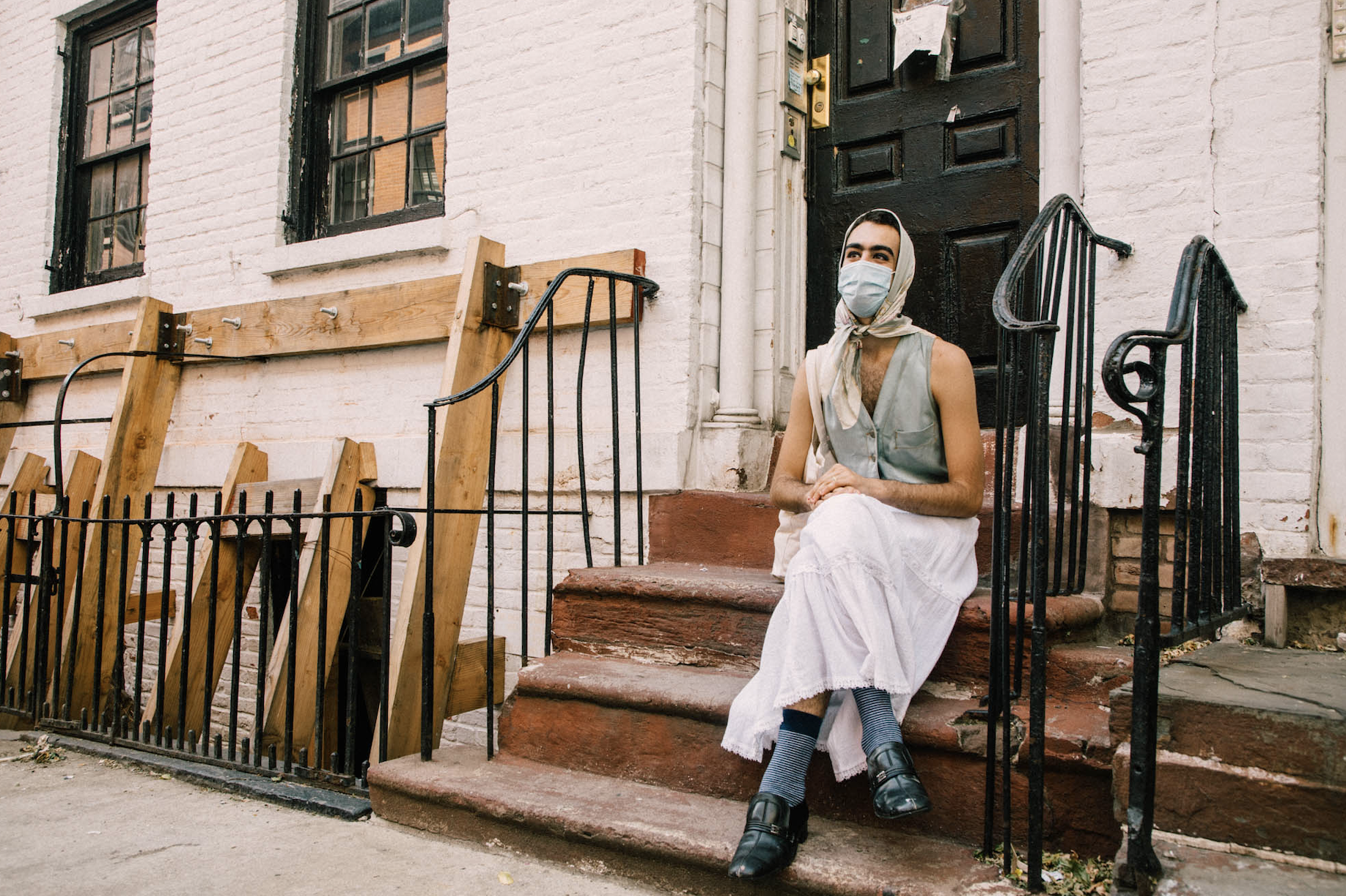
Please, introduce yourself and tell us what brings you out here today.
I am here today in support of, particularly, Black trans community as they continue to be marginalized and oppressed throughout this country. And I am here to also remind fellow white people, that this is the work that we need to be focusing on specifically in this moment.
And when we think of Pride, we need to be focalizing Black trans women specifically in our politics and in our minds when we are protesting moving forward.
What are your hopes for the future?
My hopes for the future are dismantling white supremacy and ending capitalism in this country. My hopes are that right now people can find a moment of peace and joy with their friends, maybe even just alone if they are alone today.
These are tumultuous times, but change is never something that is slow and that feels comfortable, so I take it as a good sign.
Steven Neptunite
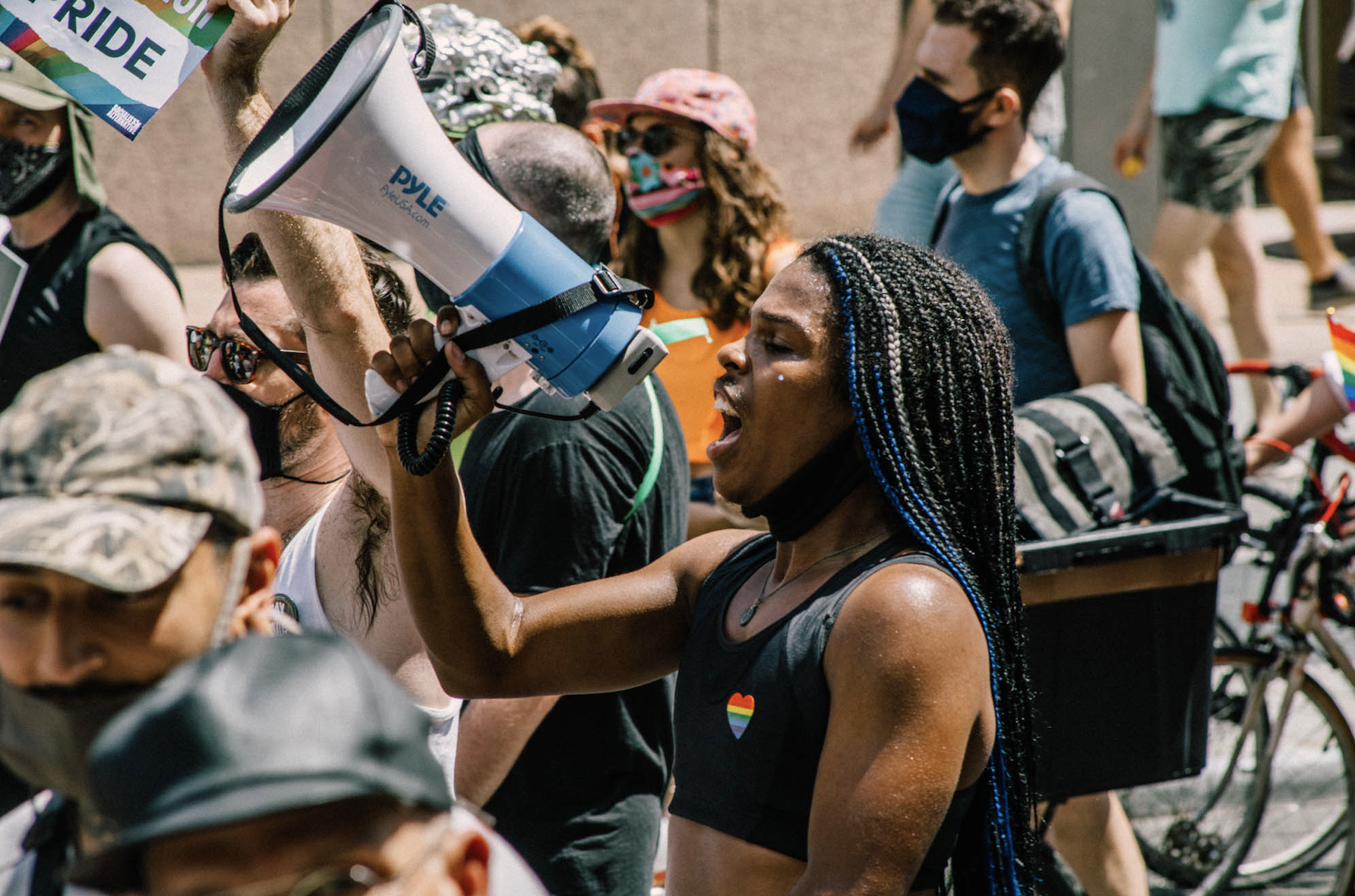
Please, introduce yourself and tell us what brings you out here today.
I am here in celebration of not only Pride, but I’m also here for Black Lives Matter, because we celebrate Pride, but too often so many people get left out of this movement.
I believe that by combining BLM with LGBTQ+ Pride we can actually bend together and learn intersectionality and learn that we have a common oppressor. This builds a lot of strength to see people of color and queer people of color here as well as white people.
What are your hopes for the future?
My hope for the future is that we get to dress and look however we want and identify however we want and not have to deal with the threatening looks, not have to deal with the shit talk, not have to deal with the potential violence threats and the death threats. That is my hope for the future.
And my hope for the future is also, for us queer people of color to work within ourselves as well, because there is a lot of self-hate among our community; it’s not just our common oppressor. It’s gotten to the point where we teach this shit to ourselves and we need to fix that.
One of my hopes for the future is for us to stand in harmony and as one, like we should have a long time ago.
Andy Jean

Please, introduce yourself and tell us what brings you out here today.
I am here today for Black trans liberation, not only today, but each and every day. Moving forward, so that these folks, honey, [cops] are fucking abolished. Thank you. That’s why I'm here.
What are your hopes for the future?
My hope for the future is that no more Black and brown trans people have to be subjected to violence, that they have to be killed and that they could actually be free, fully, beautifully. That is my dream.
Madelyn Keith, Graham D'Craquer
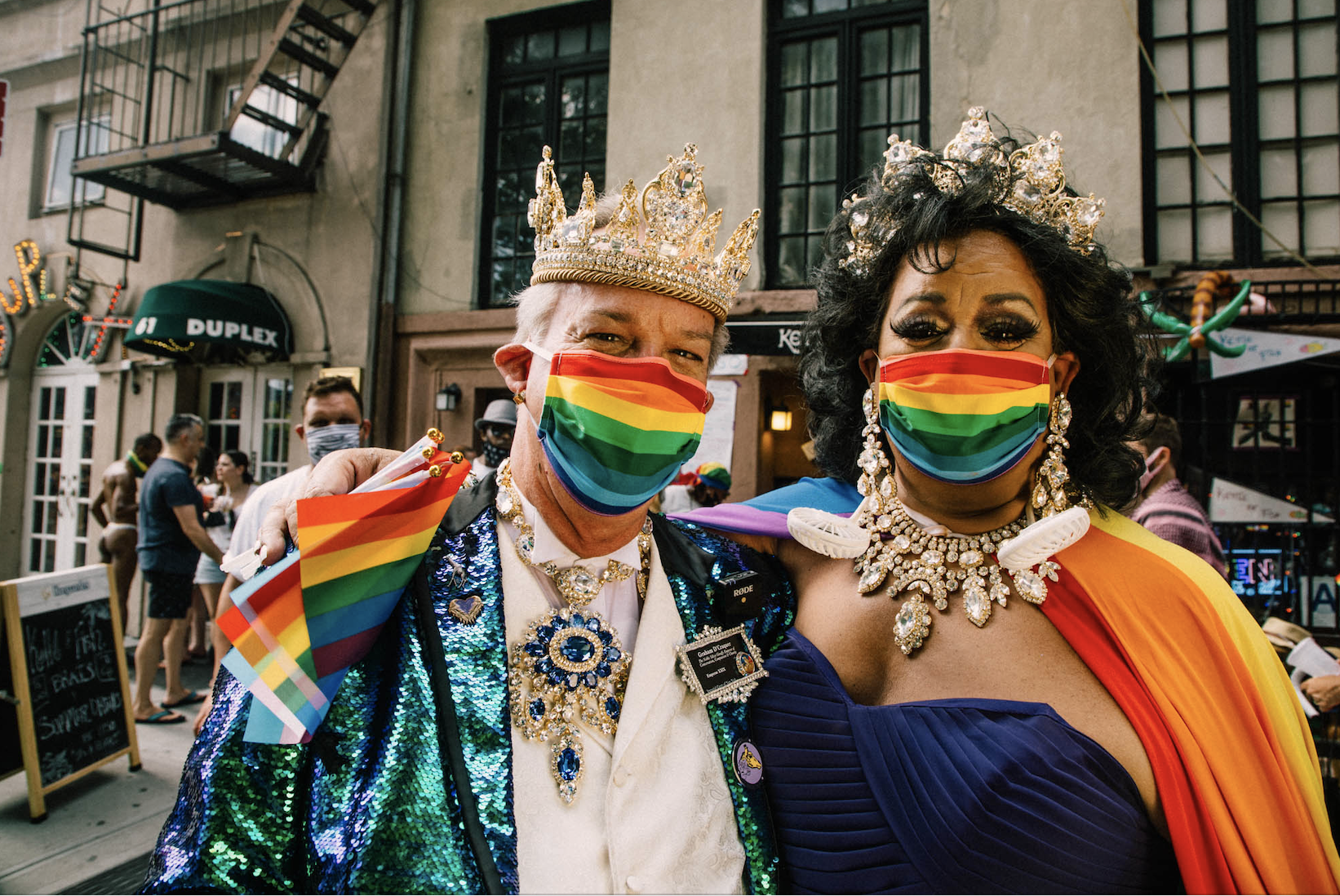
Please, introduce yourself and tell us what brings you out here today.
Madelyn: My name is Madelyn Keith. I am empress 34 of the Imperial Court of New York.
Graham: And I am Graham D’Craquer, and I am member 29 of the Imperial Court of New York. And we are husbands in real life. So the Imperial Court of New York is a 501c3 charity organization that raises money for LGBTQ+ organizations, and we do it through events. And we figured since there is no Pride parade today, we’d just walk around, spread a little joy, spread a little cheer.
Madelyn: Imperial Court is 35 years old, and we are the producers of Night of the 1000 Gowns, which takes place in the spring. This year, our coronation was canceled due to the coronavirus, but we wanted to come out; we wanted to say hello; we wanted to show people we are here, we are proud, and that we love everybody.
Graham: Absolutely.
What are your hopes for the future?
Madelyn: First, I’d love to see everybody get through this, so we could get back to doing what we do: fundraising and charity, visiting people in hospice, and just bringing a little light to people.
Jen Cinclair, Sugar B.
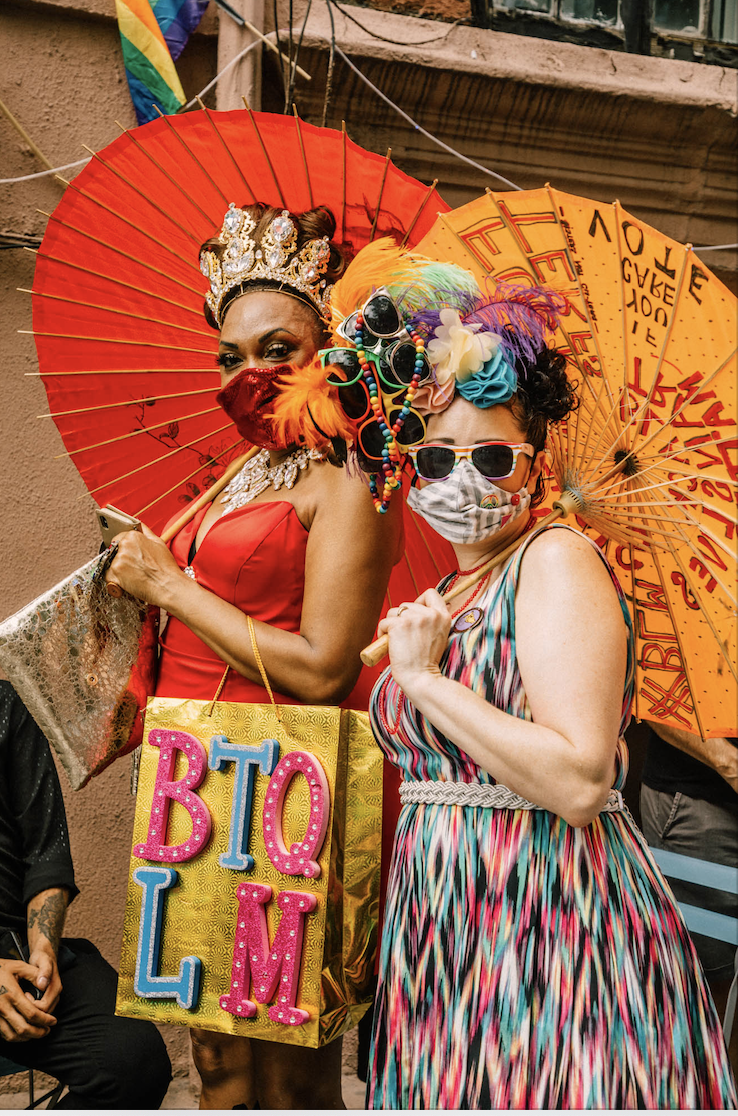
Please, introduce yourself and tell us what brings you out here today.
Jen: I am here with one of my besties whom I met at the Imperial Court of New York. She happens to be the first Black biological woman empress of the Imperial Court of New York. She’s fucking amazing, and we marched with our court friends today.
Sugar: I am, like Jen said, one of the first biological women of color, for a cis woman to reign with the Imperial Court of New York. We are a fundraising organization that mostly comprised drag queens, drag kings. We cater to the LGBTQ+ community. We raise money for a lot of organizations. My emperor was actually working at Stonewall when the riots happened. So we are considered the Stonewall monarchs of the Imperial Court of New York.
What are your hopes for the future?
Jen: No regressions. At least keep the rights that we have right now and move forward. No regressions at least step 1, and steps 2 through 50...so many fucking things.
Sugar: I have a basic theory: If you take care of yourself, in turn you take care of other people. Wear your masks; stay inside; don’t believe that you are better than anyone; don’t believe that you are not immune to what's going on. There is a lot of people out here today, but you cannot cancel Pride. Pride is something that we do.
But in the same spirit, stay safe. And if you can and when you can stay home... And I hope to hug someone very shortly. Oh my god I miss it. I miss hugging and kissing and loving people — it’s the most amazing thing.
Joel Rivera
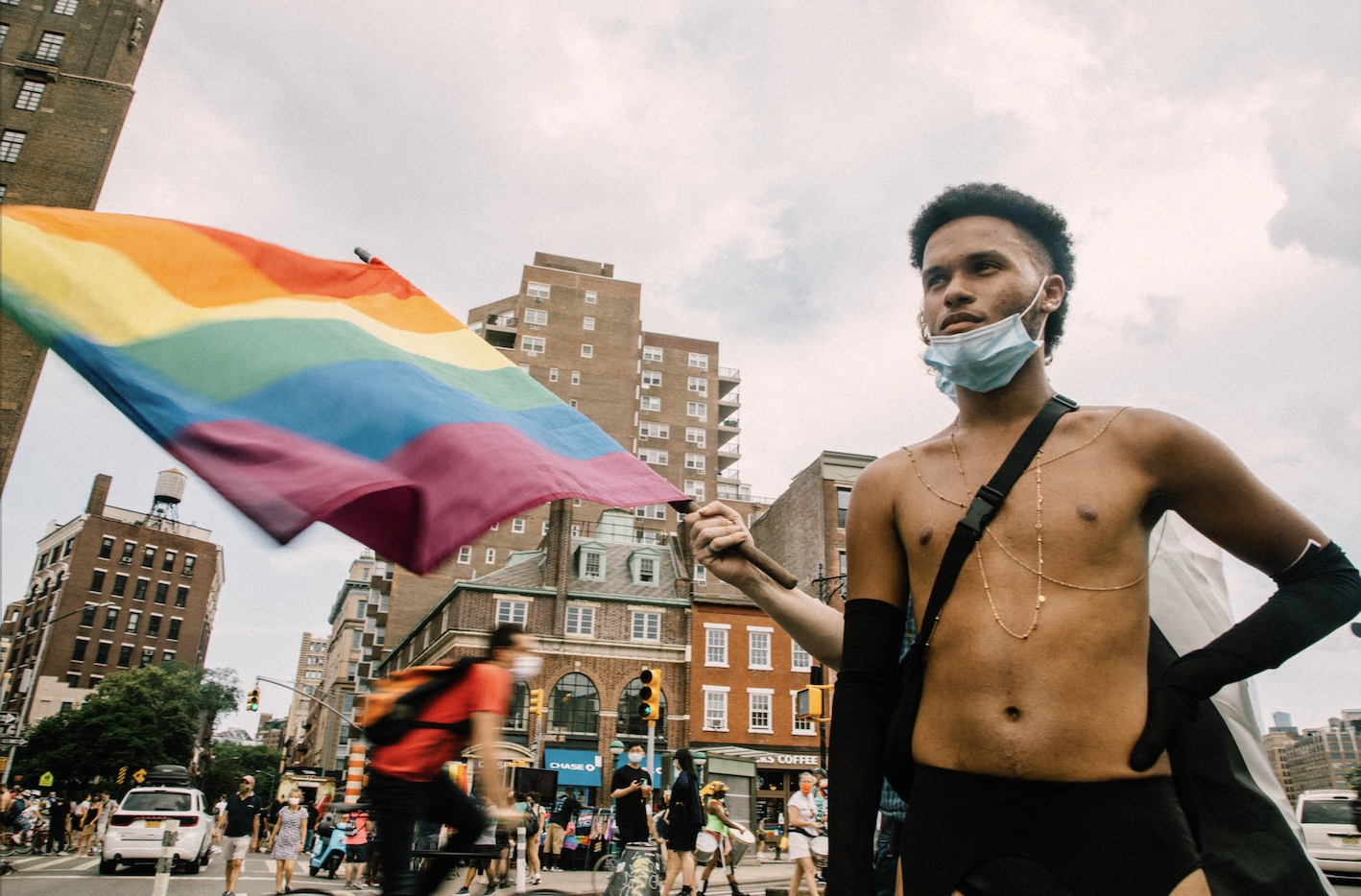
Please, introduce yourself and tell us what brings you out here today.
At 15, I had to move out of my home, because not many Black queer people are not necessarily accepted into our houses. I'm 19 now, and I still got a high school education. I'm in college right now, and I've been an active member of the Black Lives movement since the day I was born and now I'm here.
I do a protest at Stonewall every Thursday. [And] now what I'm currently doing is stopping traffic, because I know when the Pride parades that are led by white people, when they organize they stop the streets. But when it's for Black people, they let the traffic go. They try to dismantle us. So that’s why I’m here; it only takes one person.
"It should not be a stretch to be able to love everyone, but some people just make it so difficult."
I feel like the people here — they don’t want to join in, that’s fine. A lot of people are pussies, I can’t help that. So I’m here just doing that, doing my part, causing chaos, because like I said, I'm not peaceful; I’m not violent. I say I'm not peaceful, because I am here to cause noise, to cause chaos. I'm here to wake people up.
But I'm not violent, because the police are violent. People that hate in their hearts are violent. I don’t have hate in my heart, so I'm not violent.
What are your hopes for the future?
I guess it's kind of cliché: I hope for equality. I hope that if I was to go on a train just like this, I wouldn't face any harassment. I hope that there is a new system that doesn’t see the color of your skin but sees the content of your character. That's what Martin Luther King said.
I hope that every single person in the world, now that’s crazy, but I hope that every single person in the world finds love in their heart. If you have love, it doesn't matter your sexuality, your gender identity, your skin color, because you will just love everybody. And honestly, I take it back when I said it was a stretch. It should not be a stretch to be able to love everyone, but some people just make it so difficult.
Xander Gaines

Please, introduce yourself and tell us what brings you out here today.
It’s Pride. It’s New York. I wanna see my family, my friends, my sisters, and although I can’t be with them the way I normally am, I could be among them so I’m out.
What are your hopes for the future?
A future. A future. That’s my hope. Just having a future.
Editor's note: More images have been added after originally publishing and a correction has been made to a quote by Katie Rose Summerfield.
